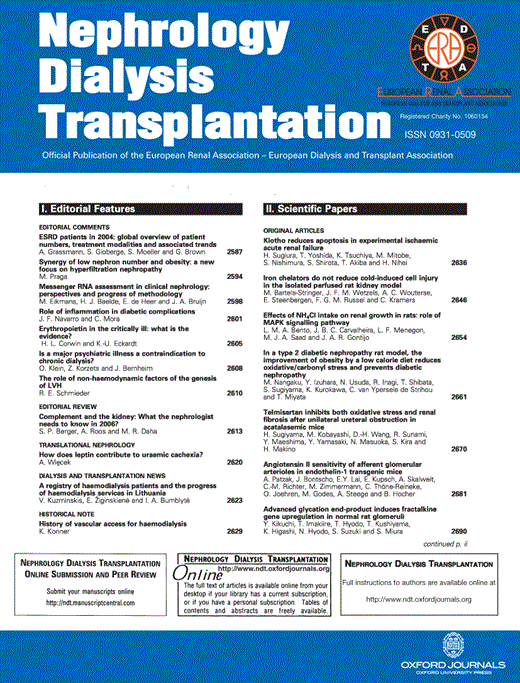-
PDF
- Split View
-
Views
-
Cite
Cite
Damian J. McKeon, Charles Haworth, John R. Bradley, Diana Bilton, Cystic Fibrosis pulmonary disease is not a contra-indication to live-related renal transplantation, Nephrology Dialysis Transplantation, Volume 20, Issue 3, March 2005, Page 664, https://doi.org/10.1093/ndt/gfh647
Close - Share Icon Share
Sir,
A 26-year-old male cystic fibrosis (CF) patient (delta F508 homozygous) presented with symptoms of a pulmonary exacerbation and was treated with aminoglycosides. His CF was complicated by pancreatic insufficiency, CF-related diabetes, a previous orthotopic liver transplantation (1996) for CF related liver disease and CF bronchiectasis. On this occasion it was noted that his serum creatinine had risen from 102 to 180 mmol/l. His intravenous treatment was curtailed, but his serum creatinine continued to increase to 447 mmol/l and he presented in frank pulmonary oedema requiring emergency dialysis. His other risk factors for renal failure included CF-related diabetes and regular use of tacrolimus (2 mg once daily) prescribed for immunosuppressive therapy following his orthotopic liver transplantation. He subsequently developed chronic renal failure and was treated with regular haemodialysis. This had disastrous consequences on his general CF health and his quality of life. Over 3 months his weight diminished from 67 (dry weight) to 59 kg. His malnutrition was compounded by nausea resulting from uraemia and a fluid restriction that made dietary supplementation difficult. He required frequent treatments for pulmonary exacerbations which could only be treated with reduce dose mono-therapy such that his FEV1 measurement diminished by 1 l. His CF-related diabetes become very difficult to manage due to erratic eating habits and increased pulmonary exacerbations resulting in regular hypoglycaemic episodes. His Hba1C was measured at 8%. He also developed a uraemia cardiomyopathy resulting in a reduced left ventricular ejection fraction of 38%.
After a case conference with the renal physicians, CF physicians and transplant surgeons, he was listed for a live-related renal donor transplant. The transplantation was uncomplicated. The patient and graft have survived their first year and of note there have been no episodes of graft rejection since the transplant was performed. His most recent serum creatinine, taken 12 months since transplantation, is 90 mmol/l. His pulmonary function has improved from 55% predicted (1.95 l) to 65% predicted (2.9 l). He has regained the 6 kg lost during dialysis and his pulmonary exacerbation frequency has reduced from eight to two per annum. His HbA1C has also improved to 4.9% reflecting better diabetic control.
This case highlights the fact that moderate CF pulmonary disease is not a contra-indication to renal transplantation and, on the contrary, live-related renal transplantation may have widespread benefits in CF patients with dialysis dependent renal failure in terms of general well being and likely improvement in survival [1,2].
Conflict of interest statement. This article has not been previously published in whole or part or abstract form and there are no conflicts of interest.
References
Aurora P, Wade A, Whitmore P, Whitehead B. A model for predicting life expectancy of children with cystic fibrosis.
Author notes
1Adult Cystic Fibrosis Centre Papworth Hospital Papworth Everard Cambridge, UK2 Renal Transplant Unit Addenbrookes Hospital Cambridge, UK Email: mckeon@doctors.org.uk





Comments